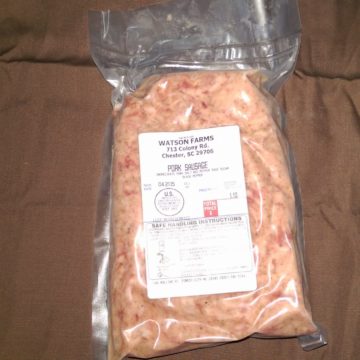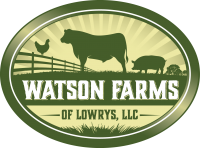Native grasses, new tools, and customers like you make better farmers
There’s trend taking hold in the Southern plains of the U.S. that we should all pay attention to: farmers converting cropland to pasture. This trend is outlined in this informative article in the New York Post.
It is fairly well-known that the Ogallala Aquifer has been drying up for decades as crop farmers pulled out massive quantities of water for irrigation. As groundwater diminishes the economics of farms are finally catching up with the ecological capacity of the once-abundant natural resources in this region.
A solution for some is hoped to be found in converting the land back to native pasture and grazing it with cattle. These native grasses, with the help of the buffalo, are what built such rich soils that were so tempting to grow crops on in the first place. What nature took millennia to build, mankind can deplete in a little over one hundred years.
Our farm was transitioned back to grass back in the mid-1990s. In the many preceding decades before, it has seen a lot of tillage. About 6 different homesteads can still be identified here today, most of which housed sharecroppers who relied on cotton and small grains for their living. Some of the equipment used then is still around including a horse drawn grain binder like the one in this video. The families that lived in these homesteads definitely weren’t the first generation to plough up perennials and convert to annuals. That had been done generations ago. But although they were well-intentioned, they continued using methods that allowed precious topsoil to wash away when heavy rains came.
Native grasses are far more resilient to drought and pestilence than annual row crops. As perennials, they also keep root systems alive in the soil which prevents erosion. On our farm today, the soil surface is hardly ever exposed. Either trampled grass or grass that is in a state of growth is always covering the ground. This insulates the soil from the elements. It softens the blows of harsh rains and shields the soil from the scorching sun. It helps us retain moisture during dry spells and the grass flourishes much more quickly from a 4-6 inch height than from a 1-2 inch stubble.
Today’s generation of farmers will need to adapt just like about every other generation has. Consumers like you play a huge role in this. When you support us, other farms across the country notice through avenues like our YouTube channel. Our success along with that of others like us will encourage other farmers to make transitions to pasture-based agriculture in order to stay viable. The informed, open-minded consumer that cares about the environment has a huge part to play in this new era of American agriculture. Join in if you haven’t already!
Here’s a video from a while back showing a paddock shift that would have been much more difficult just 40 years ago. In this video you see us using temporary electric fence to simulate the kind of grazing pressure followed by long periods of rest that built the prairies. We use polywire, geared reels, a UTV, and a very powerful energizer to power miles of electric fence. None of these things were readily available just a few decades ago, but with these tools we can enable our cattle herd to mimic nature much more efficiently.
Product Spotlight
Pigs can be raised in a regenerative manner as well as cattle. And that’s exactly what we do with ours – fresh pasture every 7 days and they never see concrete or a confinement house. Taste the difference yourself and stock up on our breakfast sausage while it is on sale! (By the way, check out the deep discount on the 40-lb bundle!)
-
 Mild Sausage$8.25
Mild Sausage$8.25 -
 20-lb Bundle of Mild Sausage in 1 lb packs (UPS)$189.00
20-lb Bundle of Mild Sausage in 1 lb packs (UPS)$189.00
You can see ALL of our ON SALE products with the button below.
We re-use packaging!
We’ve seen a good response to our efforts in re-using packaging! Thanks and keep it up.
You can help us reduce our carbon footprint by returning your CLEAN egg cartons and meat boxes.
The main reason that we switched to plastic egg cartons a while back was because they are so much more durable than paper which could only be used once. They also protect the eggs much better!
So if you have some egg cartons or boxes to return, you can just place them on your porch on your home delivery day. Farm pickup customers can, of course, drop them off when you come to pick up your new order.
Thanks for helping us re-use our packaging!
Referral Program
If you enjoy our products please consider passing the word along to your neighbors, friends and family! We don’t spend a lot of money of advertising but rather depend on customers like yourself to advertise for us if they are amazed by our products and customer service.
All you have to do is refer someone to us and when they place an order for the first time they will get a link to a form where they can say who referred them. You and the new customer will receive a $15 credit! So make sure they tell us your name. Hit the button for more info!
Order Deadlines
Charleston: 12 noon Mondays
GSP: 12 noon on Wednesdays
Charlotte/Rock Hill: 12 noon Fridays
Farm Pickup: Please wait until you receive an email stating that your order is ready to be picked up (usually 1 business day from when you place your order). Farm Pickups will now be done during our store hours:
- Monday, Tuesday, Thursday, Friday: 10am to 6pm
- Saturday: 10am to 2pm
- Closed Sunday and Wednesday
Did you know that we have a webpage that displays all the reviews we have received?
Check it out!
Check out this ⭐⭐⭐⭐⭐ review:
“I have now bought two whole beef from Watson Farms. The meat is excellent. I drive over four hours just to be able to support something that is not just wonderful quality and a good deal, but also a moral choice that does good for a neighbor, the animals, and the earth. There is no downside. I only wish I could encourage more people to buy in bulk and from this wonderful family/farm. Thank you guys!”
We would greatly appreciate it if you would be kind enough to leave us a review. It helps first-time customers purchase with confidence.
Thanks again for being partners in this endeavor of local, pasture-raised proteins that has truly transformed our farm. We look forward to continuing this transition while serving you long into the future.
Sincerely,
The Watsons
Pasture Posts is written by Matt Watson.
